- Order number: NCD-R820PL
- Manufacturer product ID: R820PL
High-Power Relay Controller 8-Channel + 8 Channel ADC ProXR Lite
ProXR Lite USB Relay Controllers make it easy to switch high power loads while monitoring sensors. Integrated analog to digital converters make it easy to measure temperature, light, humidity, or other types of analog sensors that operate in the 0-5VDC range. ADCs can also be mapped to manually control a relay, allowing you to add manual on, off, or toggle buttons for relay control. This video shows the hardware features of our high-power 8-channel relay board with a USB interface installed.
8-Channel High-Power Relay Controller with 8-Channel ADC
This ProXR Lite relay controller is capable of switching 8 on-board 20-Amp SPDT or 30-Amp SPST, ideal for high-power switching applications. Each 20-Amp SPDT relay includes 3 quick-connect terminals for normally open, common, and normally closed contact closure relay output connectivity. The 30-Amp SPST relay has two quick-connect terminals for normally open and common connections. This controller features a modular communications interface, capable of accepting USB, RS-232, Ethernet, WiFi, Bluetooth, Industrial Wireless communication modules, and more. On-Board Analog to Digital Converters allow monitoring of 8 inputs at 8 or 10-Bit resolution. Analog inputs are ideal for connecting external sensors, or connect buttons and switches to the inputs and configure the controller to manually control relays when buttons are pressed. Turn relays on or off, toggle the state of a relay, or trigger relay flashers all from external switches.
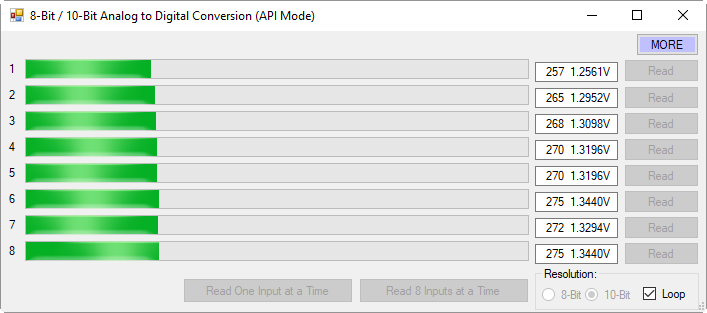
ProXR Analog to Digital Inputs are used to Read External Sensors or Manually Control On-Board Relays
AD8 8-Channel 8/10-Bit Analog to Digital Converters
This controller is equipped with 8-Channels of 8/10-Bit Analog to Digital Converters, capable of reading analog voltages from 0 to 5 Volts DC. The ADCs on this controller allow monitoring of external sensors or contact closure input detection. Connect external temperature sensors, light sensors, current sensors, buttons, switches, or anything else that generates a 0-5VDC analog or contact closure output. With 8-bit resolution, analog inputs will convert 0-5 Volt signals into a value from 0 to 255. With 10-bit resolution, values of 0 to 1023 may be measured. Input resolution is software selected. Simply ask the controller for the analog value of each input, and the controller instantly responds.
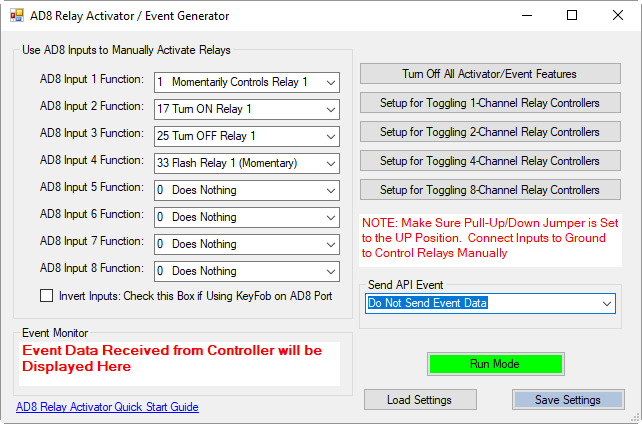
Use the Relay Activator to Configure Analog Inputs for Direct Control of Relays
Relay Activator and Analog Inputs
The Relay Activator control panel allows analog inputs to directly control relays. Simply connect the analog inputs to buttons or switches and trigger basic relay on or off functions to take manual control of the on-board relays. The Relay Activator control panel allows you to define 8 functions for each of the 8 inputs. Functions include turning relays on or off, toggling the state of relays, momentarily flash a relay, momentarily toggle the flashing function of a relay, turn all relays on, turn all relays off, and push notification events. When push notification events are configured, the controller generates a packet of data every time the inputs change state.
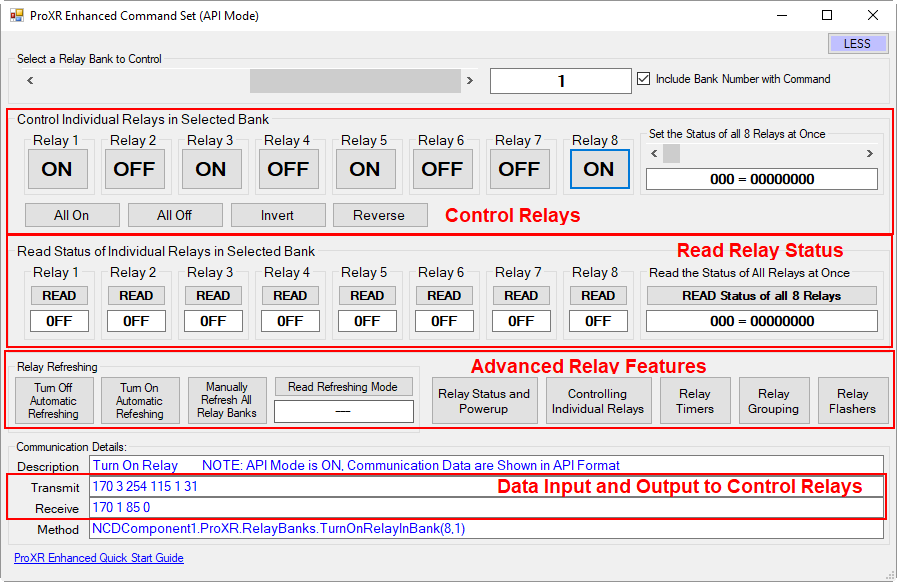
Base Station Software Controlling NCD Relay Controllers
Base Station Software
Base Station Software was designed to help you learn the ProXR command set. Explore ProXR features using our Graphical User Interface. Watch data bytes flow to and from the board, so you easily understand the command execution process. There is no faster or easier way to learn how to automate than Base Station, as it was designed to work with our complete array of communication modules, including Wireless, Ethernet, USB, RS-232, and many more. You only need a Windows 8 or 10 Computer to Run Base Station. Base Station was written in Visual Studio, and we even provide the source code to help you on your way!
LabVIEW Relay Control Support Coming in 2018
We are pleased to announce that official LabVIEW relay control drivers will be supported beginning January of 2018. This is our first official release of LabVIEW drivers for ProXR series Relay controllers! We are finalizing the drivers and resources now. We will post in the News section as well as the Learn section of our site as soon as we are ready.
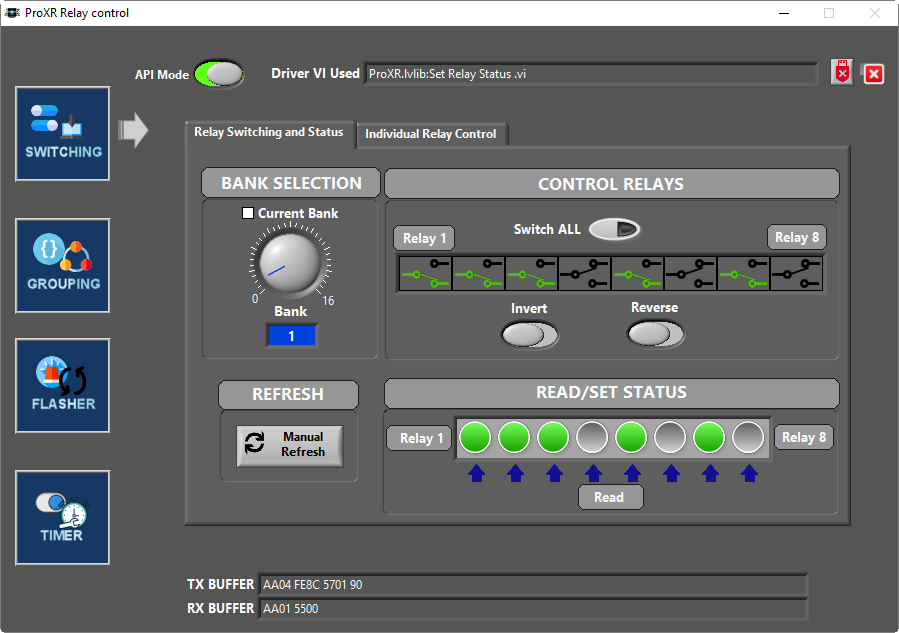
LabVIEW ProXR Relay Drivers
ProXR Lite vs. ProXR Series
ProXR Lite controllers are smaller, surface-mounted variants of the ProXR Series relay controllers. The firmware is nearly identical between the series with ProXR Lite being limited to 8 relays. Only the ProXR series includes a XR expansion port for relay expansion. ProXR Lite controllers are a lower-cost alternative to ProXR because they are machine manufactured in larger quantities. ProXR series controllers are currently manufactured with through-hole technology and socketed chips, making them field serviceable. ProXR Lite controllers are available with little as 1 or 2 relays while ProXR Series focuses on applications that require 4 or more relays.
ProXR Lite Communication Options
We take communications seriously, as we believe in a modular communications and firmware that properly supports scalability into future interface technologies. ProXR controllers support API communications, which effectively wrap every command with a header, payload, and checksum to ensure reliability. NCD API commands increase processing speed because no serial timeout is required prior to command processing. NCD API commands increase reliability, as only a proper checksum will authenticate a command and allow it to process. When we first implemented API, internet communications via a TCP/IP socket could be realized because the timing problems of internet communications were eliminated. While API is optional, it is strongly advised. Our Base Station software uses API communications, so it’s possible to control a ProXR controller over the internet after configuring port forwarding on your router.
ProXR series controllers are the world’s most adaptable controllers, capable of communicating with a wide variety of communication options. Pick any of your favorite communication technologies: Bluetooth, USB, WiFi, Ethernet, Ethernet Web-i WebRelay, 802.15.4 Wireless, ZigBee Mesh, Key Fob, or RS-232. ProXR easily adapts to the communication technologies you need most. We are committed to modular communications, so your ProXR series controllers can easily be retrofitted for other applications as your needs change. ProXR controllers are never obsolete, as we are actively releasing new communication technologies that greatly enhance the connectivity of our ProXR series controllers.

802.15.4 Long-Range Wireless
Use 802.15.4 Communications if you require industrial strength long-range wireless communications. 802.15.4 is a point-to-point wireless standard, allowing fast communications. The wireless protocol acts as a long-distance wireless serial port, allowing wireless operation with no modification to software.

900HP-S3B Industrial Wireless Mesh
Long-Range Wireless Mesh networking is our favorite of all wireless communication technologies. This communication module will hop data from one location to another to reach its intended destination. Data hopping is a integrated feature of this communication technology, users do not need to do anything other than make sure wireless modules stay within hopping range of each other. We use the Digi 900HP-S3B module in our products, as this is the best the industry has to offer. With a 2 mile range between modules and up to 8 hops, it is possible to cover 16 miles of wireless territory using this technology. Using high-gain antennas, this module is capable of communicating to a remote module up to 28 miles away.
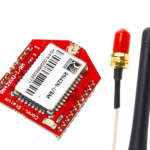
Bluetooth
Bluetooth is a easy way to add wireless communications to the NCD Industrial product line. The Bluetooth communications option acts as a transparent serial port between your computer and NCD devices. Simply pair the device with your computer and access the device through the COM port that is associated with the Bluetooth communications module.

Ethernet TCP/IP
Control NCD devices using standard Ethernet TCP/IP communications. Simply open a socket and send and receive TCP/IP data to control our devices. Our Ethernet TCP/IP Communication modules feature the Lantronix XPort communications module, the best in the industry. The Lantronix XPort module is an industrial workhorse that we have trusted for many years.

Ethernet Web-i WebRelay Communications
NCD Controllers equipped with a Web-i WebRelay interface may be controlled from a built-in web page. The NCD WebRelay interface module feature a Ethernet connection, allowing control of our devices from anywhere in the world using a web browser.
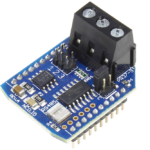
RS-485 Serial Communications Node
Our RS-485 Serial Communications Module makes it easy to network up to 256 NCD devices together at distances up to 4,000 feet. Each RS-485 node includes 3 screw-terminals for a 3-wire connection to the RS-485 master.

RS-232 Serial
NCD RS-232 Serial Communication modules make it easy to integrate the worlds most prolific communication standard. Easily interface to desktop PCs and laptops for easy control via standard serial commands. Most NCD devices typically default to 115.2K Baud; however, older low-cost devices implement 9600 baud data rate as the predominate standard.

USB
Our USB interface module makes it easy to control our devices using the USB port. Simply plug into any available USB port and start controlling our devices using standard serial commands. NCD USB Interface modules feature genuine FTDI USB to Serial Converter Chips, the very best in the industry.
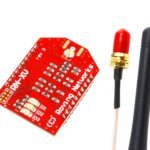
WiFi TCP/IP
Control NCD devices using standard WiFi TCP/IP communications. Simply open a socket and send and receive TCP/IP data to control our devices. NCD WiFi communication modules are manufactured by Microchip, the world leader in microcontrollers.

ZigBee® Wireless
ZigBee® wireless communications is a popular standard among our customers. The wireless protocol acts as a long-distance wireless serial port, allowing wireless operation with no modification to software.
20-Amp SPDT Relay Option
This controller is available with a 20-Amp relay option, allowing control of high-power loads up to an absolute maximum of 240VAC at 20 Amps. Ideal for high-power switching applications, this relay should never be used for low-power signals. The 20-Amp relay is of the SPDT variety, which provides Common (C), Normally Open (NO), and Normally Closed (NC) connections. Common is connected to NC when the relay is off. Common disconnects from NC and connects to NO when the relay is activated. This relay uses .250″ Quick Connect terminals (optional accessory) to connect to the top side of the relay. The relay is molded with COM, NC, and NO markings into the plastic.
30-Amp SPST Relay Option
This controller is available with a 30-Amp relay option, allowing control of high-power loads up to an absolute maximum of 240VAC at 30 Amps. Ideal for high-power switching applications, this relay should never be used for low-power signals. The 30-Amp relay is of the SPST variety, which provides Common (C) and Normally Open (NO) connections. Common has no connection when the relay is off. Common connects to NO when the relay is activated. This relay uses .250″ Quick Connect terminals (optional accessory) to connect to the top side of the relay. The relay is molded with COM, NO markings into the plastic.
Features
- Control 8 On-Board High-Power Relays via Wireless or Computer Control
- Available with 20-Amp SPDT or 30-Amp SPST Relays for High-Current Switching
- On-Board LEDs Display Relay Status, Busy State and Ready State
- Use Base Station Software to Help you Learn the ProXR Command Set
- Modular Communications Interface Supports Many Popular Communication Modules:
- WiFi, Bluetooth, Ethernet, WebPage, Industrial Wireless, USB, RS-232 and More
- 16 Background Timers Can be Assigned to Any of the On-Board Relays
- Server Reboot, Watchdog, & Keep Alive Duration/Pulse Timing Command Set
- Control One Relay at a Time or All Relays Simultaneously
- Integrated 8-Channel 8/10-Bit Analog to Digital Converter Inputs
- Read Sensors or Manually Control Relays with Integrated ADC Inputs



